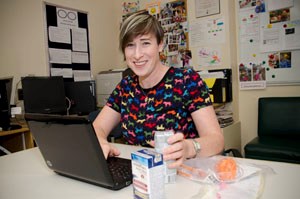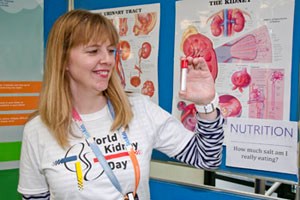Good nutrition is integral to improving health in patients
Summary:
As a part of the interdisciplinary care team, dietitians work closely and collaboratively with health-care staff to provide family-centered care across the hospital. In recognition of Nutrition Month, which takes place every March, let's take a glimpse into the important work they do.
By Emily de Medeiros
An apple a day may not keep the doctor away, but good nutrition is essential to help maintain and improve the health of our patients.
Did you know that the Clinical Dietetics team at SickKids works with 75 per cent of inpatients in the hospital? As a part of the interdisciplinary care team, dietitians work closely and collaboratively with health-care staff to provide family-centered care across the hospital. In recognition of Nutrition Month, which takes place every March, let's take a glimpse into the important work they do.

When patients have cancer or blood disorders, the condition and associated treatments often affect appetite, tolerance to foods, and the body's ability to properly use nutrients. Dietitians work closely with doctors, patients and families to ensure children are well nourished by prescribing the proper nutrition plan and monitoring blood work, weight and any changes in their treatment.
"Good nutrition is proven to help improve healing time and maintain strength. It can also play a role in the ability to fight infection, and ultimately, in survival," says Rivanna Stuhler, Clinical Dietitian in Haematology/Oncology/Bone Marrow Transplant.
Each child has their own nutritional needs that are reflected in their individual diet plans. Some patients are prescribed low-bacteria diets which focus on food safety and preparation to avoid further illness when immune systems are low. In some cases, dietitians use feeding tubes or IV nutrition to ensure that children who are having difficulty with oral feeding get the proper nutrients.
"Taste changes are very common during chemotherapy, so children may not like or even taste flavours that they used to enjoy," says Stuhler. "We try to find new ways to adapt flavours and textures to make food more pleasurable to the senses and to encourage children to eat."

When treating patients with eating disorders, achieving a healthy weight is critical to improving physical, psychological, social and emotional functioning. Dietitians in the Eating Disorders Program at SickKids work directly with members of the medical and mental health teams to help patients achieve and maintain a healthy body weight.
In addition to the medical and psychological assessments, diagnosing an eating disorder includes a comprehensive assessment of the patient's growth, current nutritional status, eating and weight control related behaviours. These are all factors in determining the treatment plan for each patient.
Each patient and family is unique and has their own challenges. "We try to dispel any myths or misconceptions that patients and families may have about food in order to reintroduce it into their diet" says Jaimie Kennedy, Clinical Dietitian in Adolescent Medicine. "It is a constant balance between being the nutrition expert and providing the support needed to implement change."
According to Kennedy, food and weight are often sensitive topics and one of the biggest challenges is being careful with your words when empowering families to take on the responsibility of feeding their child.

Dietitians in the Nephrology Program provide specific diets and nutritional care to children with a wide range of kidney diseases.
"In many cases, patients have dialysis treatments to help with kidney function as they wait for a kidney transplant," says Andrea Aquilina, Clinical Dietitian in Nephrology. "Nutrition helps maintain healthy blood levels and can help patients to grow and achieve a healthy weight throughout their treatment."
Patients with kidney diseases are often put on special diets that are low in sodium, phosphorous, and potassium. This means certain fruits, vegetables and dairy are restricted. The amount of liquids a patient consumes may also be limited.
"Patients and families are often concerned when a dietitian restricts such common healthy foods," says Aquilina, "but a kidney-friendly diet is important to prolong kidney function."
The majority of children with cystic fibrosis (CF) have pancreatic insufficiency, or the inability to produce digestive enzymes making it difficult to digest, absorb and utilize nutrients from food. Dietitians help patients with their goal of maintaining a healthy weight through nutrition and use of oral pancreatic enzymes.

Choosing foods that support a high energy diet is extremely important for patients with CF because lung infections can affect a child's appetite and make it hard to meet energy demands. In some cases patients need a gastrostomy tube overnight to help increase their calorie intake.
"We guide the families early on how to choose the right foods and ensure that their child gets a variety of foods to promote their health, weight gain and growth," says Daina Kalnins, Director of Clinical Dietetics, and Academic and Clinical Specialist in the CF Clinic. "We also adjust the enzymes as the child gets older and their diet changes."
Dietitians provide continued nutritional support to patients with routine follow-ups in early diagnosis, as well as consultation by email and phone.
"Seeing children grow and gain weight because of suggestions you've made by working with the family and other health-care members is the most gratifying thing as a dietitian," says Kalnins.
For more information about health and nutrition please visit the Dietitians of Canada website.

